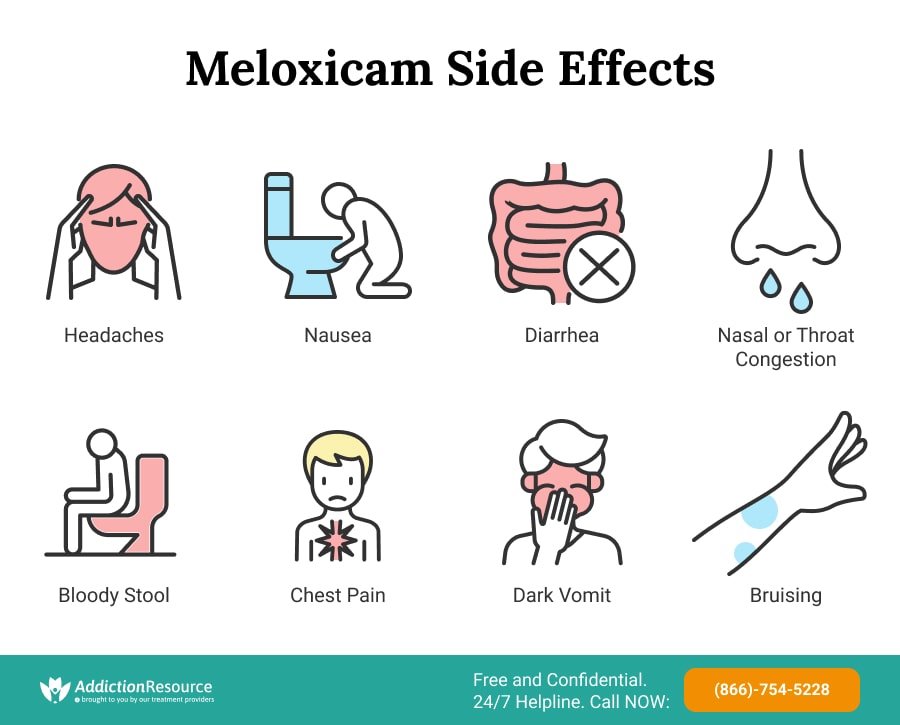Meloxicam, known by the brand name Mobic, belongs to a class known as nonsteroidal anti-inflammatory drugs (NSAID) indicated in the treatment of osteoarthritis and rheumatoid arthritis symptoms, namely pain and inflammation. However, it finds common use as a potent analgesic for moderate pain.
Table Of Contents:
It is strictly a prescription medication due to the risk of abuse and severe Mobic side effects. As a result, the drug should only be used when prescribed and in line with the prescribing information.
So, what severe reactions can it cause? Does Meloxicam cause weight gain? What are some warnings users should know? Find out here.
Common Mobic Side Effects
Mobic works by blocking the production of enzymes that cause joint inflammation and pain in arthritis and rheumatoid arthritis. It is available in tablets and oral suspension. But the mechanism of action is also associated with specific negative symptoms.
Meloxicam side effects include some mild and common ones, as well as severe reactions that need immediate attention from a doctor.
Some of the Common Meloxicam Side Effects Are Listed Below:
- Headaches
- Upset stomach
- Nausea
- Diarrhea
- Bloating
- Gas in the digestive tract
- Constipation
- Dizziness
- Nervousness
- Nasal or throat congestion
A multicenter study extending over twelve weeks found that anywhere between 5.5% to 8.3% of patients on either 7.5 mg or 15 mg complained of a Meloxicam headache. It is one of the most common Meloxicam side effects that occur. However, a Meloxicam headache generally has no significant risk to the health.

Besides the common Mobic side effects, several severe adverse reactions can occur. Most of them occur very rarely and in less than 2% of patients, though their incidence is increased when the substance is abused. Severe GI effects were seen in just 1.7% of patients.
If any of these severe Mobic side effects occur, the drug should be stopped, and the individual should present at the hospital or contact their medical doctor immediately.
Some of the Other Serious Side Effects of Meloxicam Tablets Are:
- Bloody stools
- Chest pain or shortness of breath
- Fluid retention in the body resulting in swelling
- Dark vomit
- Decreased urination
- Skin rash or bruising
What Are the Adverse Reactions of Long-Term Use of Mobic?
Mobic is an NSAID, and with long-term use to manage chronic pain, such drugs are generally associated with a cluster of similar side effects. They include the risk of inducing ulcers, GI bleeding, kidney failure, and heart attacks. They can also worsen pre-existing heart failure and hypertension when used chronically. These are typically included among Meloxicam warnings on the prescribing information that comes with the medication.
Some studies have shown links between chronic NSAID use and the development of psychosis and cognitive impairment.
The Following Are Some of the Chronic Health Effects That Mobic Can Cause:
- Liver damage
- GI perforation
- Gastrointestinal bleeding
- Stroke
- Heart attack
Does Meloxicam Cause Weight Gain or Loss?
Many who use this medication may notice changes in their weight. Weight gain and weight loss are both seen with its use, though only rarely. It is a side effect documented in less than 2% of those who use Mobic. Weight loss is not a direct effect of the drug; instead, it results from the loss of appetite and nausea that may occur. There is, however, a direct link between weight gain and the use of this drug.
How Does Meloxicam Cause Weight Gain?
Unexpected weight gain while taking Mobic may be caused by the retention of fluid in the body. It results in swelling of the body and increased weight. If weight gain happens, it must be checked by a doctor immediately because Meloxicam warnings include unexpected weight gain as a severe adverse reaction of the drug.
Does Meloxicam Raise Blood Pressure?
Mobic and high blood pressure (hypertension) are associated with each other as another severe adverse reaction of Mobic 159 pill. When taking this drug, hypertension can increase the risk of stroke or cardiac arrest. These risks are increased when this pill is used for long durations or taken in high doses. Therefore, patients should monitor their intake of Meloxicam and check blood pressure regularly to ensure that it is not raised. In the case of hypertension, they should consult their doctor without any delay.
Mobic and alcohol interactions also can increase blood pressure in patients, so it is recommended to avoid any alcohol intake during Mobic therapy.
Meloxicam Side Effects in Pregnancy
FDA has put Mobic in the D pregnancy category. According to studies and trials, this medicine should not be used by pregnant women, especially in the last trimester. It should be removed from the system before the last three months of pregnancy. It is believed to cause damage to the fetus. Therefore, it is not advised to be used by breastfeeding women.

Meloxicam drug interactions to avoid, especially in pregnancy, include several blood-pressure reducing drugs, aminoglycosides, cyclosporine, and blood-thinning drugs.
Does Meloxicam Thin Blood?
Yes, it does to some extent. When used with other blood-thinning drugs, it can cause bleeding, which may even be fatal. Mobic interaction with tramadol should also be considered in such situations. There are no specific studies that show whether Mobic is passed on in breast milk or not. Therefore, the drug should be avoided by breastfeeding mothers.
Meloxicam Warnings
There are some significant effects that Mobic can have on the health, and these are included among Meloxicam warnings in the drug’s prescribing information. They are not absolute contraindications, but it is vital for those who use the medication to be aware of these adverse health effects, particularly in people who have certain pre-existing conditions.
These Warnings Include the Following:
- In the gastrointestinal system, the drug can result in gastrointestinal tract bleeding or the development or worsening of stomach ulcers.
- There can be an increase in the levels of liver enzymes, and in some cases, it can result in liver failure.
- Cardiovascular effects can include heart attacks, the formation of blood clots, and stroke. These can be fatal.
- Fluid retention, also known as edema, which manifests as swelling of the body, typically starting from the feet.
- It can cause kidney failure and damage.
- In the skin, Mobic use can cause severe conditions such as Stevens-Johnson syndrome, toxic epidermal necrolysis, and exfoliative dermatitis.
Patients with pre-existing conditions such as heart disease, peptic ulcer disease, hypertension, and liver failure, should avoid using Mobic. Alternatively, they should provide all previous health information to their medical doctor, who will then use that information to choose pain relief medication.
Don’t Take Mobic With Other NSAIDs
Can a patient take ibuprofen with Meloxicam? Since ibuprofen is also an NSAID, patients should not use it with Mobic without consultation from a doctor. Both of them act as blood thinners. When used together, they increase the chances of internal bleeding and renal toxicity.

Other NSAIDs like Celebrex may be used instead to avoid the severe adverse reactions of Mobic. However, when considering Mobic vs. Celebrex, Celebrex should not be used by patients with heart disease.
How to Minimize Meloxicam Adverse Effects?
Mobic is an NSAID drug used to treat pain, swelling, tenderness, and stiffness of joints caused by arthritis and other related conditions. Side effects of Meloxicam in humans span a wide range of problems that could arise while taking this medicine. Therefore, whenever a medical doctor prescribes the medication, Mobic adverse reactions are weighed to ensure that the benefits outnumber the negative reactions.
There are some steps that one might take to minimize the adverse effects of this drug.
These Steps Include the Following:
- Provide your doctor with all information on chronic health conditions, drugs currently being used, drug allergies, and medical history
- Any side effects, regardless of how mild, should be noted and discussed with your medical doctor
- The medication should only be used exactly as prescribed
- Taking this medicine after a meal also reduces the chances of a stomach ulcer or stomach irritation
- To reduce the less severe gastrointestinal symptoms like heartburn, gas, or bloating, patients should take the medication on a full stomach
- In the case of adverse reactions which are severe or that do not leave, discontinuing the drug should be considered
If adverse effects of Mobic become severe or abuse to this medication has been developed, professional addiction treatment is the right step to take. Meloxicam withdrawal symptoms are not common, and if present, are usually not severe. However, stopping the drug can cause the pain to come back. This will require looking for Meloxicam alternative medications that should be discussed with the doctor.
Frequently Asked Questions
Does Meloxicam Make You Sleepy?
Drowsiness is not among the common side effects (those that occur in more than 2% of patients) of this medication. On the contrary, the drug is more likely to cause insomnia than drowsiness, and it is seen in 3.6% of patients. It can cause dizziness, however.
What Are the Dangers of Meloxicam?
The dangers of Meloxicam include abuse of the drug, which predisposes to other dangers, such as GI bleeding, stomach ulcers, GI perforation, liver and kidney failure, skin conditions, and heart issues. It is important to make sure that your medical doctor is aware of any conditions you may have to reduce the risk of these dangers.
Can Meloxicam Cause Allergy?
Some individuals may be experiencing an allergic reaction to Meloxicam, but that is not a common adverse effect of this drug. Other Meloxicam allergy symptoms include skin irritation or skin rash.
However, more severe Mobic side effects related to allergies include asthma attacks, hives, shortness of breath, and other allergic reactions. Patients with a history of a similar allergic reaction to aspirin or other NSAIDs should not use Mobic. It will most certainly cause severe adverse effects in those individuals. Such symptoms can also be part of the side effects of Meloxicam.
Hope Without Commitment
Find the best treatment options. Call our free and confidential helpline
Most private insurances accepted
Page Sources
- Martin, R. M., Biswas, P., & Mann, R. D. (2000). The incidence of adverse events and risk factors for upper gastrointestinal disorders associated with meloxicam use amongst 19,087 patients in general practice in England: cohort study. British journal of clinical pharmacology, 50(1), 35–42. https://www.ncbi.nlm.nih.gov/pmc/articles/PMC2014964/
- C.S. Mott Children’s Hospital, meloxicam (oral/injection), 2020, https://www.mottchildren.org/health-library/d04532a1
- Goldstein, J. L., & Cryer, B. (2015). Gastrointestinal injury associated with NSAID use: a case study and review of risk factors and preventative strategies. Drug, healthcare and patient safety, 7, 31–41. https://www.ncbi.nlm.nih.gov/pmc/articles/PMC4310346/
- Eccleston, C., Cooper, T. E., Fisher, E., Anderson, B., & Wilkinson, N. M. (2017). Non-steroidal anti-inflammatory drugs (NSAIDs) for chronic non-cancer pain in children and adolescents. The Cochrane database of systematic reviews, 8(8), CD012537. https://www.ncbi.nlm.nih.gov/pmc/articles/PMC6460508/
- Yocum, D., Fleischmann, R., Dalgin, P., Caldwell, J., Hall, D., & Roszko, P. (2000). Safety and efficacy of meloxicam in the treatment of osteoarthritis: a 12-week, double-blind, multiple-dose, placebo-controlled trial. The Meloxicam Osteoarthritis Investigators. Archives of internal medicine, 160(19), 2947–2954. https://jamanetwork.com/journals/jamainternalmedicine/fullarticle/485487
- Saag, K. G., Rubenstein, L. M., Chrischilles, E. A., & Wallace, R. B. (1995). Nonsteroidal antiinflammatory drugs and cognitive decline in the elderly. The Journal of rheumatology, 22(11), 2142–2147. https://pubmed.ncbi.nlm.nih.gov/8596158/
- Marcum, Z. A., & Hanlon, J. T. (2010). Recognizing the Risks of Chronic Nonsteroidal Anti-Inflammatory Drug Use in Older Adults. The annals of long-term care : the official journal of the American Medical Directors Association, 18(9), 24–27. https://www.ncbi.nlm.nih.gov/pmc/articles/PMC3158445/
- Distel, M., Mueller, C., Bluhmki, E., & Fries, J. (1996). Safety of meloxicam: a global analysis of clinical trials. British journal of rheumatology, 35 Suppl 1, 68–77. https://academic.oup.com/rheumatology/article-pdf/35/suppl_1/68/5043688/35-suppl_1-68.pdf
- United States Food and Drug Administration, Mobic (meloxicam) tablets prescribing information, 2011, https://www.accessdata.fda.gov/drugsatfda_docs/label/2012/020938s022lbl.pdf


